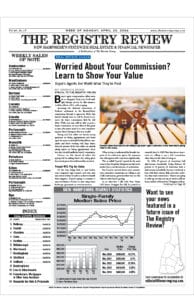Login
Gain Insight and Intelligence
Keep abreast of significant real estate, banking and financial developments in Massachusetts and Rhode Island. Make smart business decisions with the most comprehensive property and transaction information available anywhere to help you spot trends, generate leads and build strategies.
Become a New Subscriber today or Login to access our subscriber-only content.
If you have any questions regarding your subscription, please call us at 617-896-5367 or email us at subscriptions@thewarrengroup.com.

